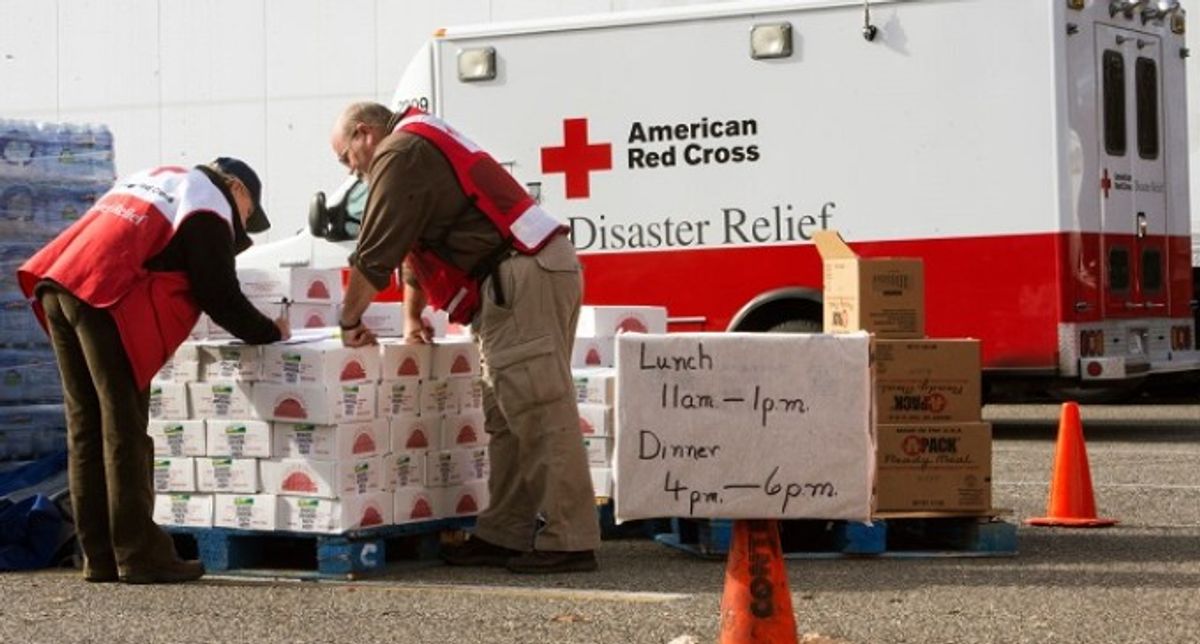On 12 August 2016, catastrophic flooding devastated areas of Louisiana. The flooding lasted for at least ten days, and many Louisiana residents were displaced from their homes in the wake of the disaster.
On 24 August 2016, Fox Nation columnist Todd Starnes published an editorial claiming that a police officer was asked to leave a Red Cross shelter for praying with victims of the floods:
A law enforcement officer said he was asked to leave a Red Cross shelter in Lafayette, Louisiana after he prayed with several flood victims.
Clay Higgins, a reserve city marshal and a local legend, dropped by after work to minister to evacuees at the Heymann Performing Arts Center on Aug. 19.
“I was not proselytizing,” he told me. “I was just there to thank volunteers and offer prayers and encouragement.”
Higgins, who is also running for Congress, was dressed in uniform and was holding a Bible.
At some point during the visit a volunteer approached Higgins and mentioned there was a problem.
“He said the Red Cross had an issue with me being there,” Higgins said. “So I asked him what the problem was. He looked down at my Bible and he gestured and said, ‘They have a problem with that.’ ... I was told that the Red Cross does not allow spiritual counseling in their shelters,” he said. “The supervisor told me the Red Cross is not a religious-based organization and they don’t allow religious interaction with the residents.”
Starnes maintained that others told similar tales of being told they "could not pray or read Bibles":
Meanwhile, a pastor in the town of Albany told me that four families left a Red Cross shelter after they were told they could not pray or read their Bibles at their cots.
“They got upset and literally packed up their stuff and came right here,” said the pastor, who asked not to be identified. “A Red Cross worker told them they could not pray or read their Bible in public.”
Starnes' article spread with rumors that prayer was banned in all Red Cross shelters.
On 26 August 2016, the Red Cross issued a statement addressing the claims:
The American Red Cross sincerely apologizes for any confusion around the issue of prayer in Red Cross shelters. Faith is an important part of helping people recover after a disaster, and people in our shelters are always welcome to pray, read their bibles and gather among themselves–we simply ask that they are respectful of others. There are hundreds of people of different values and faiths sharing a large space in our shelters, and we want to respect the privacy of everyone.
If a shelter resident would like to speak with a spiritual advisor, the Red Cross can help to facilitate that connection. When needed, we can also provide private spaces for residents to pray and engage in religious activities with their preferred spiritual advisors.
The Red Cross follows the guidelines set forth by the National Voluntary Organizations Active in Disaster to provide appropriate and respectful disaster spiritual care. Through our Disaster Spiritual Care program, trained Red Cross workers bolster hope and resilience for the survivors and their families by helping people draw upon their own spiritual resources – values and faith – in the midst of their pain, regardless of their faith tradition.
American Red Cross spokeswoman Nancy Malone spoke to reporters about the rumors, specifically addressing Higgins' assertion that he was ejected from a Red Cross shelter for praying with victims:
Nancy Malone, a spokeswoman for the American Red Cross, said there's misinformation being spread around, and people are confusing the Red Cross with their partner organizations. Malone acknowledged that the organization does have a policy intended to be respectful of all faiths, but she said if Higgins had approached managers they would have accommodated him.
The National Voluntary Organizations Active in Disaster (VOAD) guidelines referenced by Malone were extensive, published to the organization's web site [PDF] and ratified in 2014. A document titled "Appropriate and Respectful Disaster Spiritual Care" says that prayer and spiritual counsel are an integral aspect of comprehensive disaster response protocols:
In harmony with the National VOAD Disaster Spiritual Care Points of Consensus 1 and 5 we believe that disaster can disrupt spiritual experience and that spiritual care can help rekindle hope and resilience. Spiritual care takes a variety of forms, including words of comfort and encouragement, use of prayer, sacred writings, ritual, written materials, worship services and so on. The privilege of using spiritual and religious resources in disaster spiritual care, however, involves certain responsibilities as stated in Points of Consensus 8 and 9; among them are:
Recognizing the right of each individual and faith group to hold to their existing values and traditions.
Refraining from manipulation, disrespect or exploitation of those impacted by disaster and trauma.
Respecting the freedom from unwanted gifts of religious literature or symbols, evangelistic and sermonizing speech, and/or forced acceptance of specific moral values and traditions.
Avoiding the exploitation of the imbalance of power between DSC providers and those being served in any way, including:
o Not using position, influence, knowledge or professional affiliation for unfair advantage or for personal, organizational or agency gain.
o Not using disaster response to further a particular political or religious perspective or cause.
o Carrying out all activities according to the need of individuals, families and communities.
o Not tying assistance to the embracing or acceptance of a particular political or religious creed.
Higgins maintained he was asked to leave a Louisiana shelter for praying with victims, adding he was not "proselytizing" (and suggesting that proselytizing, not prayer, was at issue in that situation). However, Red Cross disaster aid recipients of all denominations are expressly permitted to pray (but encouraged not to proselytize) in shelters. Whatever happened, the Red Cross has not "banned" prayer in shelters, and its policies are clear and easy to find online.

